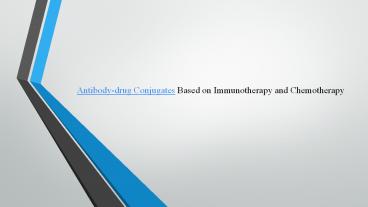antibody-drug conjugates - PowerPoint PPT Presentation
Title:
antibody-drug conjugates
Description:
Antibody-drug conjugates refer to a highly targeted monoclonal antibody that is conjugated to a cytotoxic antitumor drug through a specific ligation fragment to combine the high selectivity of the antibody with the antitumor activity of the drug. In 2000, the first ADCs drug Mylotarg was approved by the FDA for the treatment of acute myeloid leukemia. – PowerPoint PPT presentation
Number of Views:37
Title: antibody-drug conjugates
1
Antibody-drug Conjugates Based on Immunotherapy
and Chemotherapy
2
Antibody-based immunotherapy and chemical-based
chemotherapy have been the two major treatment
strategies for clinical cancer treatment.
Antibody drugs target antigens overexpressed by
tumor cells, such as HER2, EGFR, and CD20. And
now a variety of therapeutic monoclonal
antibodies have achieved great clinical success.
3
In chemotherapy, mutiple drugs are developed such
as alkylating agents, antibody metabolism agents,
anti-tumor antibiotics, to inhibit tumor growth.
Although therapeutic antibodies are highly
targeted, their therapeutic effects on solid
tumors are limited due to their large molecular
weight. Meanwhile, despite the high killing
efficacy against cancer cells, small molecule
chemical drugs are less selective and often cause
serious side effects caused by accidental injury
to normal cells. Therefore, "chemotherapy" and
"immunotherapy" are often used complementarily in
the clinical practice of cancer treatment.
4
More than a hundred years ago, Paul Ehrlich, a
German immunologist, first proposed the "golden
bullet" theory of monoclonal antibodies, namely
the use of monoclonal antibodies to specifically
bind antigens to achieve targeted treatment of
cancerous cells.
5
Antibody-drug conjugate refers to a highly
targeted monoclonal antibody that is conjugated
to a cytotoxic antitumor drug through a specific
ligation fragment to combine the high selectivity
of the antibody with the antitumor activity of
the drug. In 2000, the first ADCs drug Mylotarg
was approved by the FDA for the treatment of
acute myeloid leukemia.
6
THANK YOU































